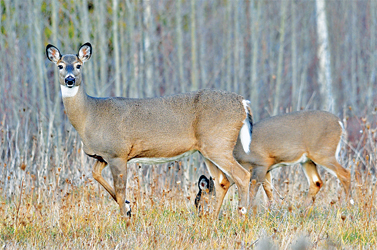MANITOULIN—A member of the Gore Bay Fish and Game Club (GBFGC) is happy that the Ministry of Natural Resources and Forestry (MNRF) is not putting in place legislation that would prevent supplemental feeding of deer when severe conditions in the winter put deer in peril.
The MNRF, in an environmental posting, has released its final decision on a White-Tailed Deer Management Plan for Ontario.
“As long as there is not legislation in place that prohibits supplemental feeding of deer when there is an emergency situation then I think it would be alright,” stated Ian Anderson, a member of the GBFGC earlier this week. “I really believe there is a place and time when supplement feeding of deer needs to take place as we have seen in certain years on Manitoulin.”
“I was hoping common sense would prevail on this issue,” said Mr. Anderson. “And we were hoping that, although the ministry is discouraging the feeding of deer even in emergency situations they have not put legislation in place that prevents it. It would make no sense to me to legislate it.”
Mark Ryckman, of the Ontario Federation of Anglers and Hunters (OFAH), confirmed the new policy “completes the suite of policy documents for large game in the province for the most part. It formulates the way things will take place and puts in place this deer management policy. No, it doesn’t make any changes with the feeding of deer policy, although they are discouraging the feeding of deer (even in emergency situations).”
The white-tailed deer management policy for Ontario decision was released on August 4, 2017. A decision was made to proceed with the management policy for Ontario, with input received through public consultation, as well as comments received from internal MNRF staff and other provincial ministries. These include recognizing deer density effects on ecosystem health, and reinforcing the need to seek permission to access private property.
It is stated in the deer management policy, “Explore approaches, and where necessary, take preventative action to address threats to deer” and “continue to discourage and, where appropriate, take measures to prevent the supplemental feeding of deer to minimize the likelihood of entry and/or spread of pathogens into Ontario.”
As Mr. Anderson noted in a story in the Recorder on April 14, “the last time there was a need for supplemental winter feeding of deer, the MNRF position was not to feed them in any way shape or form. If it wasn’t for Manitoulin Streams and local fish and game clubs and volunteers, who used equipment and other ways to save some deer, it could have been devastating to the deer populations on Manitoulin). It was the right decision at the right time.”
In places where nothing was done to help the deer the impacts were devastating (2013-2014), the previous article noted. Mr. Anderson was quoted as saying, “I know when we had the tough winter in 2013-2014 it (supplemental deer feeding) made a difference on Manitoulin Island. We lost some deer on Manitoulin, not as many as we would have, and a lot of other places were far worse off than we were (in terms of deer loss),” he added.
“We are supportive of the deer management policy, it was a long time coming,” said Mr. Ryckman. He pointed out similar policies are in place for large big game animals such as elk, bear and moose.
As for feeding of deer in the winter in extreme conditions Mr. Ryckman said, “the OFAH has maintained our deer save fund. (Three years ago) there was a program on the Island that we helped to fund. We think it is important, but the MNRF has a different view on this. We are not in support of seeing hundreds of deer die off in severe winters when they can be helped. As they (MNRF) indicate in the policy they discourage the feeding of deer.”




